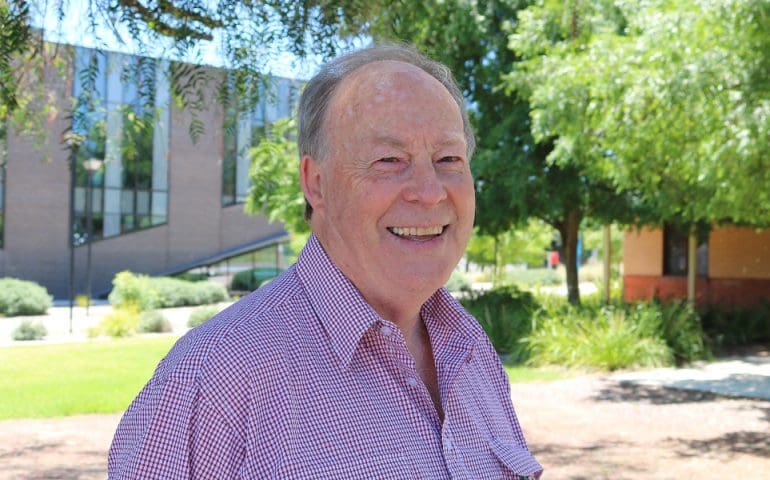THE Federal Government’s announcement that the cost of a university agriculture degree is to be slashed by 62 percent has been welcomed by the agricultural and ag education sectors.
Minister for Education Dan Tehan has flagged that the government will dramatically reduce the fees for degrees in areas of future job demand, such as agriculture, maths, science, health, teaching, nursing, information technology and engineering, while other degrees such as humanities and law will become more expensive.
Driven by the need to reboot the economy in the wake of the COVID-19 pandemic, the government is keen to encourage students to take up courses with the best potential employment outcomes.
Charles Sturt University professor of agriculture, Jim Pratley, said it was great to see the government recognise agriculture and agricultural education as an essential sector, although it was yet to be seen whether the price cut incentive would translate to higher enrolment numbers.

Professor Jim Pratley
“What it will mean is a little bit of an unknown in the sense that we don’t quite know whether those price signals work,” he said.
“The good news, though, is that the government has recognised that agriculture needs university graduates to come into the sector.
“We have been crying out for that for well over a decade. Finally, the government has acted by saying this is where the jobs are.”
Professor Pratley said the agricultural job market, like every other job sector, had stagnated during March-April, but was now recovering strongly.
“So, there will be more jobs than we have graduates. 2012 was the low point for enrolments in agriculture. For the next four years there was between a 10 and 20pc increase a year,” he said.
“It’s levelled off now, but it hasn’t gone backwards. We have maintained the recovery, but the recovery level is still below what is needed to satisfy the demand for jobs.”
While fees vary, the 62pc cut will see the cost of an agriculture degree drop from around $9000 a year to around $3000/yr.
“While the government is dropping the HECS fee, it is not necessarily making up 100pc of the difference. So, the universities will be wearing part of the cost,” he said.
“Universities are going through a really tough time at the moment with international numbers. So, we are not sure what it will mean within the university sector yet. We’ll have to see what emerges over the next few days in terms of the detail.”
Professor Pratley said while he was delighted to see that the government had recognised agriculture as an area where there was a great need for professionals, he couldn’t understand why some other important sectors were singled out to have their university fees increased.
“As someone who has been in the education sector all my life, the problem I have is the principle that universities are just about jobs,” he said.
“Universities are more about the greater education agenda, not just specifically for jobs. It’s about higher learning, learning how to learn and preparing for the jobs of the future that aren’t there yet. So, university graduates lead the way in the new employment agenda.
“We need graduates in all areas. I don’t know why humanities has been the one targeted for the big hit. We need a lot of the social and soft skills going forward because they are pretty important.”

Whilst cost of courses is a factor, the problem of agricultural education across all sectors has more to do with a host of other more important issues. Quality, content, relevance and delivery methods, to name but a few.
Over the years, we have hosted numerous student projects on our farm from leading Australian universities. By comparison, for 10 years we have hosted a second year student from Purpan University in Toulouse in France, for their summer semester. Purpan is a four year agricultural degree. By comparison I am shocked at the poor and declining quality of Australian agricultural students. You need look no further than the university entry score to agricultural faculties. That tells you everything and it won’t be fixed, Mr Tehan, by making the course cheaper — better, not cheaper. And while I am at it Mr Tehan, from whence did any government have the capacity to foresee skills in demand a half a decade ahead. There are for example, many engineers who have graduated at the onset of a recession and never worked in their area of qualification, as have humanity students. At least humanity students should have been taught to think, admittedly not a quality most governments today want to nurture.
Universities are having a tough time because, as has been the real estate property agent’s plaint – ‘too many agencies (universities).’ It isn’t a staff issue anywhere near as too much competition and too many repetitions of essential outgoings. They are businesses first and educators secondly. The university from which I post-graduated this year receives nearly $0.5 billion annual funding. As a consequence, they import ‘cash cows’ who’s common objective is to get started in immigration to Australia, with families following, not return home as educators. As result grad. certs and degrees are becoming commonplace. Four Corners “Degrees of Deception” illustrated how the change from education to business has affected Australian institutional health and the pressures put onto lecturers. Agriculture fee reduction, looking also at the massive Chinese take-up in Australia’s critical foodstuffs at ‘free trade’ gived two alerts…that overseas students do not receive the benefits and that sustainable-‘plus’ farming practices are primary. The present farming systems which have ruined our productive land and sent thousands of millions of tons of topsoil into the oceans and further are relegated to the dustbin and soil protective, no tillage, spreading of natural Australian grasses, minimal irrigation and minimal to non-use of chemicals as primary are proactive in bias. Without that it’s endgame in sight.